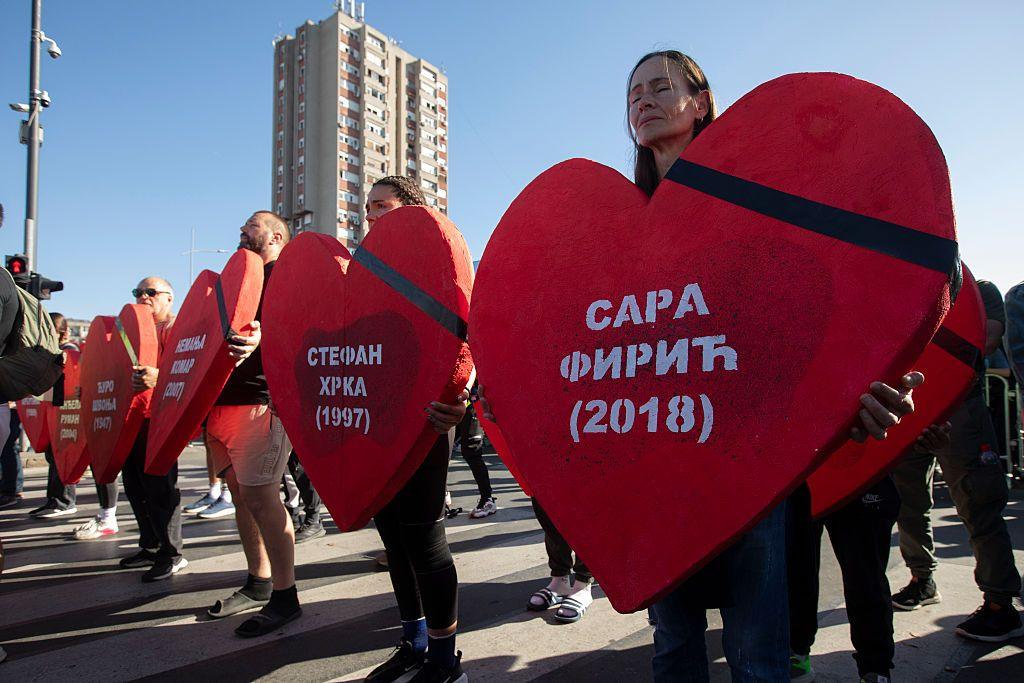A vast crowd converged on the roads leading to the Novi Sad railway station.
Tens of thousands gathered to commemorate the 16 lives lost there a year prior, on a strikingly similar warm and sunny autumn day.
The victims were either standing or seated beneath a concrete canopy at the recently renovated station when it collapsed. The youngest were a mere six years old, the eldest, 77.
The tragedy has been followed by sustained protests across Serbia over the past year. However, Saturday morning’s event saw the massive crowd focus on solemn remembrance.
At 11:52 (10:52 GMT), marking the exact time of the disaster, a 16-minute silence was observed – one minute for each victim. Family members were overcome with grief, with one woman requiring support from armed forces veterans in red berets.
Following the silence, relatives laid flowers at the station’s entrance.
While the debris from the collapsed canopy has been cleared, the station building itself appears largely untouched since the incident.
Twisted metal protruding from the walls and shattered glass remain as stark reminders of the catastrophe.
The Novi Sad station was envisioned as a symbol of Serbia’s progress under President Aleksandar Vučić’s Progressive Party. The city, Serbia’s second largest, was to be a crucial stop on the high-speed rail line connecting Belgrade to Budapest in under three hours.
Vučić and Hungarian Prime Minister Viktor Orban jointly inaugurated the renovated station in 2022, its angular, Yugoslav-era design having been updated as part of the high-speed project.
Now, after a subsequent renovation and the ensuing disaster, the station has become a symbol of what many perceive to be wrong in Serbia.
The fact that the government’s flagship infrastructure project resulted in the deaths of its citizens proved to be a breaking point for many, leading to street protests with signs reading “corruption kills”.
University students quickly emerged as leaders of the movement.
Anti-government demonstrations are not unprecedented in Serbia, but unlike previous movements that eventually faded, the student-led anti-corruption protests have remained persistent.
“Every other protest movement was organised by political opposition parties and people in Serbia don’t trust them,” says Aleksa, a 23-year-old management student at Novi Sad University.
“We are the most trusted group in the country – that’s why, even though we have made mistakes, people believe in us.”
The students have distanced themselves from opposition parties. Initially demanding accountability from authorities, they are now advocating for fresh elections.
They intend to present a list of independent, expert candidates capable of forming a technocratic government, arguing that this is the most effective way to eliminate the cronyism and corruption they believe are responsible for the railway station disaster.
In September, 13 individuals, including former Minister of Construction, Infrastructure, and Transport Goran Vesić, were charged in connection with the collapse.
A European Parliament resolution last month called for full and transparent legal proceedings and an assessment “of potential corruption or negligence” – emphasizing the “need to examine more broadly the extent to which corruption led to the lowering of safety standards and contributed to this tragedy”.
The government has denied any allegations of corruption.
The student protesters’ approach has garnered respect from some opposition leaders.
“They showed integrity and perseverance,” says Biljana Djordjević, an MP and co-leader of the Green-Left Front.
“The new generation have found their way of participating, that is the difference this time. They have cut across generations in the families, we always wanted them to be more vocal, and now they are.”
Political scientist Srdjan Cvijić, from the Belgrade Centre for Security Policy, believes the students have succeeded where Serbia’s opposition parties could not.
“Until last year, the regime had been effectively managing to render traditional politics disgusting to the overall population,” he says.
“They haven’t managed to do so with the student movement and the result is that the student movement has managed to pierce into the traditional electorate of the ruling party in a way that nobody previously managed to do.”
This may explain a recent shift in tone from President Vučić, who has typically adopted a confrontational stance towards the protesters, accusing them of attempting a “colour revolution” – similar to the pro-European movements that led to the overthrow of governments in Eastern European countries in the early 2000s.
These changes in former Soviet republics in the early years of the 21st Century pushed the likes of Georgia and Ukraine in a pro-EU direction.
On the eve of the commemoration, Vučić apologized for his heated rhetoric towards the protesters, claiming he had “said some things that I am now sorry for saying”.
The students responded dismissively, telling the president, “You have blood on your hands.”
While the day was dedicated to respect and remembrance, the underlying anger remains palpable.
If Putin does go to Budapest to meet Trump in the next two weeks, he would need to clear a few hurdles first.
US President Donald Trump claims to have ended eight wars – is that true?
Dragan Stojkovic resigns as boss of England’s group rivals Serbia immediately after his side’s 1-0 World Cup qualifying defeat by Albania on Saturday.
BBC Sport’s Olly Foster is joined by BBC football correspondent John Murray, football tactics correspondent Umir Irfan and podcaster David Walker to reflect and analyse on England’s 5-0 win against Serbia on Tuesday.
England manager Thomas Tuchel says their 5-0 victory over Serbia in their latest World Cup qualifier was “teamwork in its purest form”.

